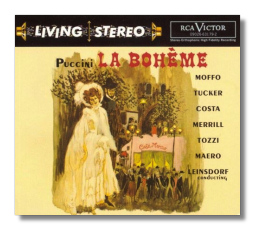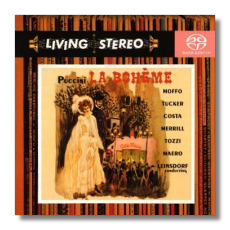
The Internet's Premier Classical Music Source
Related Links
- Puccini Reviews
- Latest Reviews
- More Reviews
-
By Composer
-
Collections
DVD & Blu-ray
Books
Concert Reviews
Articles/Interviews
Software
Audio
Search Amazon
Recommended Links
Site News
 CD Review
CD Review
Giacomo Puccini

La bohème
- Anna Moffo (Mimì)
- Richard Tucker (Rodolfo)
- Mary Costa (Musetta)
- Robert Merrill (Marcello)
- Giorgio Tozzi (Colline)
- Philip Maero (Schaunard)
Rome Opera Orchestra & Chorus/Erich Leinsdorf
RCA Victor Living Stereo 09026-63179-2 ADD 2CDs: 50:10, 49:38
Also released on Hybrid Multichannel SACD
Amazon
- UK
- Germany
- Canada
- France
- Japan
- CD Universe
One of the most perfect and enjoyable operas ever written, La bohème presents apparently limitless opportunities to each generation's singers. This recording, originally made in 1961, has been somewhat forgotten in the crush of competing versions. It is good to have it back, not just as one more testament to the durability of Puccini's creation, but also as a souvenir of some of that era's finest musicians.
I've written about the Moffo phenomenon before. She was a dramatically sensitive singer with a distinctive yet traditionally beautiful voice – why is it that her work has not been taken as seriously as that of other sopranos of her time? Was she too beautiful and glamorous? Those qualities didn't harm Maria Callas. Was it her nationality? It didn't hurt Leontyne Price. Was she insufficiently scandalous? Whatever the reasons, Moffo's representation on CD has been sketchy, although this and other Living Stereo opera reissues have helped to bring her artistry to a new generation of listeners.
Speaking of Callas, she was Mimì to Moffo's Musetta in a recording made five years earlier. Moffo's assumption of the female lead is appropriate, symbolic of Moffo's transition from soubrette to lyric-dramatic soprano. As Mimì, her bright and focused voice serves her well, and her portrayal of the fragile seamstress is involving, but without the overwhelming pathos of Callas or Tebaldi. Tucker's Italianate Rodolfo is more Radames than Bohemian poet, but he too has such an attractive voice that this oddity can be overlooked. His scenes with Merrill and the other impoverished garret-dwellers are some of the best in this set. Otherwise, Merrill's Marcello, like Costa's Musetta, seems a little distant. In the Overcoat Aria, Tozzi shows the competition how it's done, and Fernando Corena's Benoît creates instant smiles.
With this opera, I have a hundred-minute rule: if the entire performance takes less than 100 minutes, then it is too fast. Leinsdorf's total timing is 99:48, and it is not as poetic and moving as it could have been. (I have similar problems with Toscanini's recording: 94:47.) Nevertheless, Leinsdorf knew how to shape a work, and this Bohème is distinguished by its form, and for its discipline. The Roman orchestra plays well for him, and the chorus makes a vivid contribution to the two interior acts.
The sound is splendid. The original producer was Richard Mohr, and the recording engineer was Lewis Layton. They created a dramatic and realistic soundstage, and, in an attempt to create the flavor of an actual performance, they discreetly added motion and sound effects. There's a touch of distortion at some of the vocal climaxes, but I didn't notice it until I wore headphones. The libretto and cover art are taken from the original release. I miss the garish photograph of Moffo that used to grace the LPs' rear cover, however.
The many favorable qualities of this recording make it a Bohème worth having if you're having more than one.
Copyright © 1999, Raymond Tuttle



















